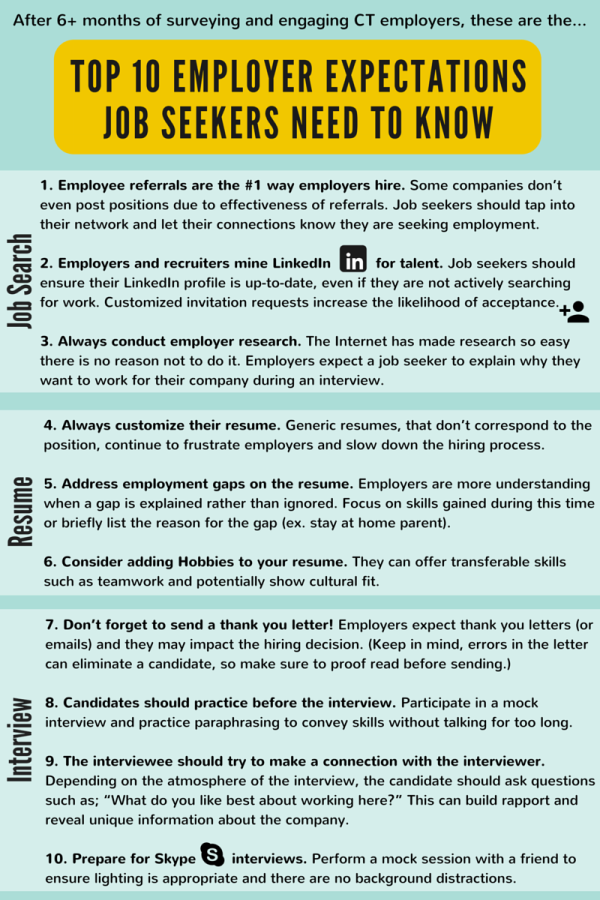Tag Archives: thank you letter
5 Tips for the #SecondInterview
By George Bernocco, CPRW
Getting the call back from the employer is always a good sign. Something about your resume may have stood out, or something about your first interview made them want you. However, you might not be the only one that has caught their eye. They may need further information to determine who the qualified candidate really is. Having made it through a first interview, you may not know what the second interview will entail. Here are some expectations, information and suggestions when you get the call.
-
The follow-up interview should not be a surprise
When the employer asked you at the end of the first interview if you had any questions, one of them should have been “when can I expect to hear back from you?” In the answer, the employer might tell you they are looking to narrow down a pool of candidates. Or they might tell you “there will be another round of interviews by this date”. Even if you didn’t get a response about a second interview, you should always expect it. Phone interviews (or teleconference interviews) can typically lead to in-person interviews. A strong candidate will know that there is always more to say about how qualified they are for the position, and should not be afraid to come back in to do it.
-
You were seen as a viable candidate
Coming in for the second interview, you stood out to the person (or people) who interviewed you the first time. If you do encounter this person at the second interview, chances are that they will not be alone. They will be demonstrating you to their boss, colleagues or your future coworkers. Acknowledge this person, and don’t be afraid to reference anything you spoke about in the prior interview. This person is your key to the success of the second interview, and you want to make sure you elaborate. By the time the second interview has commenced, you should know why they identified you for the next round.
-
What wasn’t asked, will be asked
If you feel like there were areas you didn’t cover in the first interview, rest assured you have your “second chance”. The second interview will be tougher, meaning more questions, more elaboration, more about you and more about the position. Some second interviews will bring up your salary requirements so be prepared for that question. Just remember that you should always let the employer bring up questions surrounding salary and you should never initiate the discussion. Situational questions, stress questions and/or tests will be provided to really distinguish you from the rest. Details you did not have time to cover in the first interview should be elaborated upon. Think of it this way: the first interview was generic, the second interview is specifics.
-
Third interview is always a possibility
Don’t assume the interview process is complete when you walk out the door of the second interview. A third interview and beyond can occur when an extremely large amount of people applied, or the employer just wants to be extra sure about whom they hire. Usually with the third interview, they’ve narrowed down the applicant pool to less than a handful of possible candidates. By now you should be more than confident about the position, and at this phase the employer will be discussing very specific details about the job to see how your knowledge and skills can apply.
-
Don’t forget the Thank You letter
Just as with the first interview, make sure you follow up with a thank you letter. The same rules apply: send or e-mail it out within the first 48 hours (the sooner the better). Mention specifics about the second interview and send it to any individual you met with. One page should always suffice and specifics from the interview should be mentioned.
Do not get discouraged if you are not offered the position after the second interview. You’ve stood out; they’ve seen your resume and talked with you. This company will remember you if other positions are available. They may contact you as soon as the position is posted, before any one else applies. Interviews are a way of networking, and you should have the name(s) of any one who interview you as a connection for the future.
In the years before the job market seemed to crash, second interviews were usually a great sign. They combined an interview with an orientation of the job, having the job seeker fill out necessary employment paperwork as well as negotiating salary. Now that the amount of job seekers has increased significantly, second interviews are ways of narrowing down the pool even further. Just remember that you have stood out, and elaborate on that fact. The employer will ask, in their own way, how you stand out from the other candidates. Ensure you are able to answer this as the most qualified and best person to work for their company, and your second interview will end in success.



